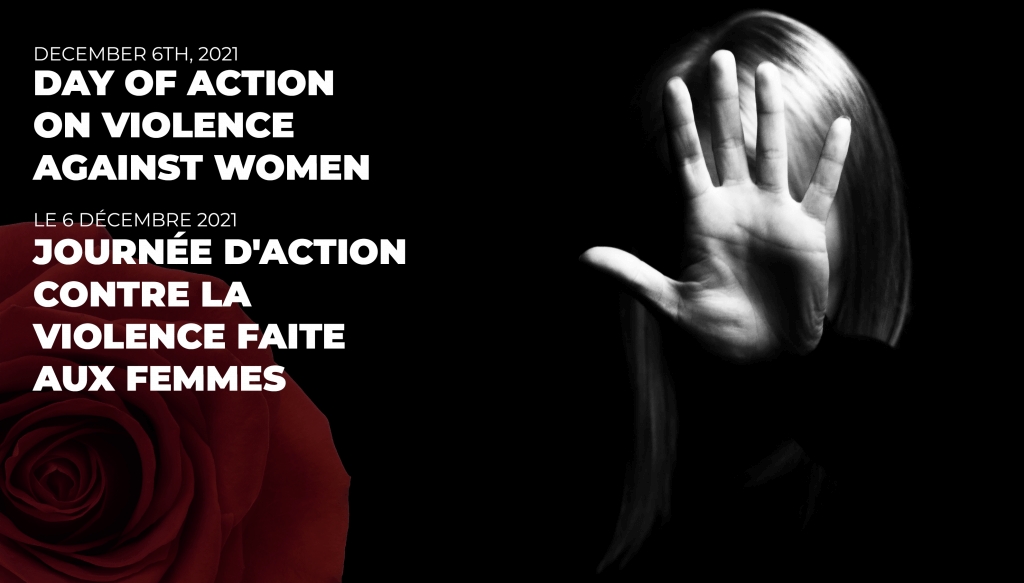December 6th, 2021 – Day of Action on Violence Against Women
In collaboration with Denise Reynolds, UCTE Human Rights Officer
In the late afternoon of December 6th, 1989, a gunman arrived at the École Polytechnique in Montréal armed with a semi-automatic assault rifle and hatred in his heart.[1]
The 25-year-old made his way into a classroom where he separated the men from the women and ordered the men out. Alone with the remaining nine female students, he declared his hatred for feminists before spraying them with bullets, killing six of them instantly. The others, wounded, played dead until he left the room.
He then moved methodically through the halls and cafeteria of the l’Université de Montréal’s engineering school, shooting more women, cutting some down as they ran for their lives, until he came to a second-floor classroom where he killed more as he ranted. After stabbing his final victim, he turned his gun on himself.
By the time police intervened, it was too late. The 20-minute rampage left 14 women dead, including 13 students and an administrative assistant.
The shooter targeted women who were destined for a non-traditional occupation, claiming that they were taking over from men. It took decades to call it what it was; Canada’s first femicide. [2]
A woman or girl is killed every 2.5 days in Canada and there is a widespread unwillingness to call violence against women what it is: an act of hatred.[3] Though statistics on the rates of reported violence against women in intimate relationships have declined over the last few decades, the reality is that violence against women has not been abated. Half of all women in Canada have experienced physical or sexual violence. We must provide a better, more consistent and nuanced approach in our support of any woman, transgender or non-binary person who has experienced violence, abuse or harassment if we are to play a role in eradicating it.
Often the social and psychological costs of reporting gendered violence offers little recourse to justice. One out of every five women who reported being assaulted had their cases dismissed by police as “unfounded,” according to an investigative series in The Globe and Mail. The recent heightened media attention on some high-profile cases has galvanized the public’s glare and gaze on these violations of human dignity. The #MeToo movement and the #BeenRapedNeverReported are examples of movements that have successfully raised public awareness.
[fusion_button link=”https://canadianwomen.org/the-facts/the-metoo-movement-in-canada/” text_transform=”” title=”” target=”_self” link_attributes=”” alignment=”” modal=”” hide_on_mobile=”small-visibility,medium-visibility,large-visibility” class=”” id=”” color=”default” button_gradient_top_color=”” button_gradient_bottom_color=”” button_gradient_top_color_hover=”” button_gradient_bottom_color_hover=”” accent_color=”” accent_hover_color=”” type=”” bevel_color=”” border_width=”” border_radius=”” border_color=”” border_hover_color=”” size=”” stretch=”default” icon=”” icon_position=”left” icon_divider=”no” animation_type=”” animation_direction=”left” animation_speed=”0.3″ animation_offset=””]LEARN MORE[/fusion_button]
Tougher gun control restrictions have been introduced in Canada thanks in part to a number of Polytechnique survivors who continue to fight for tighter restrictions even today. Emergency responders receive training on how to confront active shooters and manage their stress and emotions in order to make the right decisions in dangerous situations.
This is why we remember December 6th as a Day of Action on Violence Against Women.
We remember these faces.
These lives lost to violence.
Targeted because they were women.
[1] https://theconversation.com/the-montreal-massacre-is-finally-recognized-as-an-anti-feminist-attack-128450
[2] https://theconversation.com/the-montreal-massacre-is-finally-recognized-as-an-anti-feminist-attack-128450
[3] https://canadianwomen.org/the-facts/gender-based-violence/
